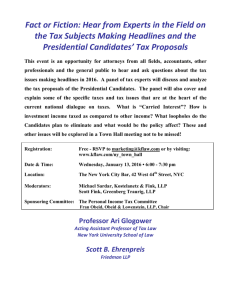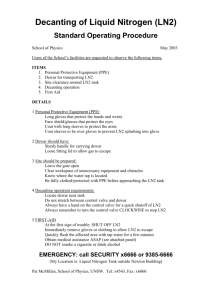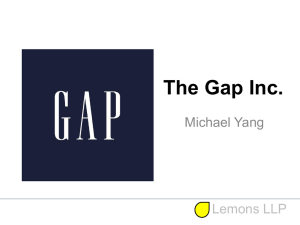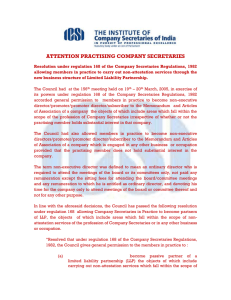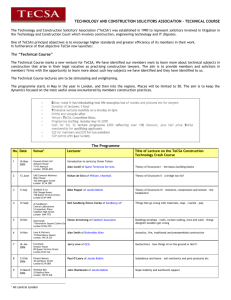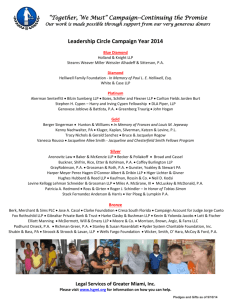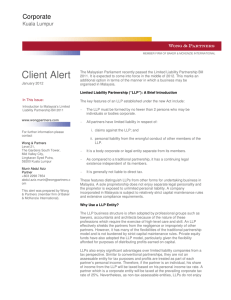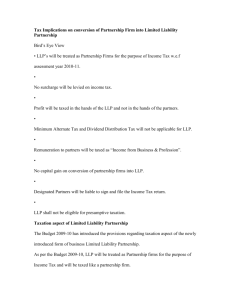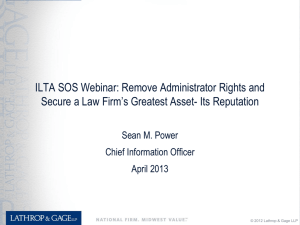Country-by-country reporting
advertisement
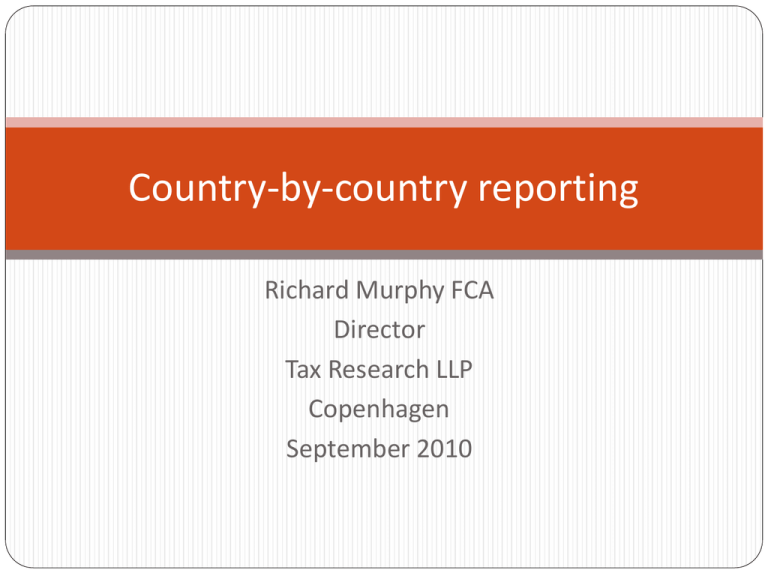
Country-by-country reporting Richard Murphy FCA Director Tax Research LLP Copenhagen September 2010 What country-by-country reporting is A system of accounting that requires that multinational corporations (MNCs) publish accounts for every jurisdiction in which they trade as part of their annual financial statements 2 (c) Tax Research LLP What it says (1) Country by Country reporting would require every MNC to declare 1. In which countries it operates; 2. What it is called in that location; 3. What its financial performance is in every country in which it operates including · It sales, both third party and with other group companies · Purchases, split in the same way; 3 (c) Tax Research LLP What it says (2) · Labour costs and employee numbers · Financing costs split between those paid to third parties and to other group members · Its pre-tax profit; 4. How much it pays in tax and other ways to the government of the country in which it is operating as a consequence 5. Some balance sheet and cash flow data 6. Additional data for companies in the extractive industries 4 (c) Tax Research LLP Why it demands this (1) Transparency matters All MNC activity is 'on the record' - especially intra-group trade CSR matters The relationship between an MNC and its host community is recorded Accountability matters You're not accountable unless you can be identified Trade matters 60 + % of world trade is intra-group - now we'll know about it People matter Employee conditions are important to us all 5 (c) Tax Research LLP Why it demands this (2) Tax matters Where do and don't you pay tax? Corruption matters Particularly holding parties to account for revenue streams in the Extractive Industries Development matters Paying tax in developing counties is vital Governance matters Many corporate failures relate to complex frauds through massive group structures - CBC exposes the risk of this Where you are matters There is political risk to trading in some places 6 (c) Tax Research LLP Why we think we have a right to this information The objectives of the IASC Foundation are, according to its constitution: "(a) to develop, in the public interest, a single set of high quality, understandable and enforceable global accounting standards that require high quality, transparency and comparable information in financial statements and other financial reporting to help participants in the world's capital markets and other users make economic decisions; (b) to promote the use and rigorous application of those standards; (c) in fulfilling the objectives associated with (a) and (b), to take account of, as appropriate, the special needs of ….emerging economies; and.....(edited) 7 (c) Tax Research LLP What we'd know if we got it (1) The precise structure of multinational corporations Who is where Under what name The importance of each jurisdiction to the reporting MNC How much tax is paid where So we can hold countries to account for it The real value of intra-group trade And some idea of where it flows How trade is used to shift profits out of developing countries and into secrecy jurisdictions Is it really $1 trillion a year? 8 (c) Tax Research LLP What we'd know if we got it (2) Who uses secrecy jurisdictions to avoid tax, and maybe by how much Could be deeply embarrassing for some Who exploits labour By comparing labour rates and numbers What risk investors face 9 In the tax structures companies use From the places in which they trade From their dependence on tax havens From corruption From poor governance (c) Tax Research LLP What we'd know if we got it (3) What risk local businesses face Especially if local companies are under-capitalised What risk states face from the companies located within them Especially if local companies are under-capitalised 10 (c) Tax Research LLP What we could do with it Massively improve understanding of the tax charge in 11 company accounts Better appraise likely future cash flows and their sustainability Enhance valuation techniques – after all p/e is heavily tax dependent Better appraise those companies who make profits and those who engineer profits Better assess governance risk Undertake better risk screening (c) Tax Research LLP The benefits that flow from CBC - 1 In summary, country-by-country reporting would: Provide a stakeholder view of accounting; Create reporting of results by country, without exception, which has previously been unknown; Provide a new view of corporate structures; Impart a new understanding of what the business of a corporation is, and where it is; Opens up a new perspective on world trade because intra-group transactions would be reported for the first time in multinational company accounts; 12 (c) Tax Research LLP The benefits that flow from CBC - 2 Give a new view of world labour markets; Create an entirely new tool for geo-political risk profiling of companies; Permit better appraisal of corporate contributions to the governments that host their activities and in the process contribute to constraining corruption on the part of some recipient governments; Provide better awareness of the true extent of tax haven activity; 13 (c) Tax Research LLP The benefits that flow from CBC - 3 Allow measurement of tax lost through tax planning by corporations through the relocation of profit; Provide a better understanding of the physical resource allocation of the corporate world. 14 (c) Tax Research LLP Why does this pay for itself? Because behaviour will change Enhanced transparency will give rise to better 15 allocation of economic resources Corruption will be reduced Risk – financial, tax, governance, corruption - will be reduced Lower risk means a lower cost of capital That creates a better investment environment That enhances long term investment returns That’s why country-by-country reporting pays (c) Tax Research LLP Contact details Richard Murphy Director Tax Research LLP The Old Orchard, Bexwell Road, Downham Market Norfolk, PE38 9LJ, United Kingdom richard.murphy@taxresearch.org.uk +44 (0) 1366 383500 +44 (0) 777 552 1797 www.taxresearch.org.uk/blog 16 (c) Tax Research LLP

